|
|
|
Sort Order |
|
|
|
Items / Page
|
|
|
|
|
|
|
| Srl | Item |
| 1 |
ID:
139574
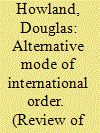

|
|
|
|
|
| Summary/Abstract |
A novel form of international order was developed in the nineteenth century by international administrative unions such as the International Telegraph Union and the Universal Postal Union. This administrative internationalism posed a striking alternative to the international society of great powers, sovereignty, and forms of imperial domination, for the members of administrative unions included not only sovereign states but also semi-sovereigns, vassals, and colonies. Members were equal and bound identically to the union treaty and its international administrative law. This article examines the structure of unions and their politics of membership in the nineteenth century, and engages theories of global governance to argue that early administrative unions present a mode of international order different from theories of both global networks and the international system of neorealism.
|
|
|
|
|
|
|
|
|
|
|
|
|
|
|
|
| 2 |
ID:
099899


|
|
|
|
|
| Publication |
2010.
|
| Summary/Abstract |
America won an asymmetric war in Iraq and lost an asymmetric peace. Translating material power advantage into favourable political outcomes has been a challenge for great powers down the ages-what makes this bridge even more difficult to cross today is the raised expectations on the part of liberal publics about the moral purpose of US-led interventions. In this sense, Iraq is part of the explanation for why influential liberals believe there is a 'crisis' in America's world leadership. 'America after Iraq' subjects this claim to analytical scrutiny-in particular it addresses whether Iraq was simply a chapter in a longer book detailing American power and purpose in the post-9/11 world? In answering this question the article is drawn to consider conceptual debates about a shift in the international system from anarchy to hierarchy with the US as the hegemonic power. While it rejects strong versions of the hierarchy thesis that imply the Washington is the new Rome, it is nevertheless drawn to an understanding of a hierarchical form of ordering where the US oscillates between a hegemonic role and an imperial outlaw. Seen through this lens, the Iraq War was an intervention that happened because it could, and not because it was just or necessary. Public opinion and the weakness of domestic institutions are also critical factors in explaining how it was possible for a previously status-quo oriented hegemonic power to act recklessly and put the rules and institutions of international society under strain.
|
|
|
|
|
|
|
|
|
|
|
|
|
|
|
|
| 3 |
ID:
185796
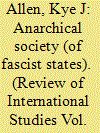

|
|
|
|
|
| Summary/Abstract |
While scholars within the English School have increasingly approached the traditionally liberal concept of solidarism in a normatively agnostic fashion, the idea of an ‘illiberal solidarism’ and historical manifestations thereof remain underexplored. One notable case in point surrounds the peculiar body of Italian interwar international thought, herein referred to as ‘international Fascism’. By discerning a synchronic outline of international Fascism, alongside the manner by which this project mutated and ultimately failed as it transformed from a vision theorised in the abstract to a practical initiative under the auspices of the Fascist regime, this article offers historical and theoretical insights into the realisability of illiberal forms of solidarism. Combining this historical account with theoretical insights derived from Reus-Smit's study on international order under conditions of cultural diversity, this article argues that the realisation of some form of solidarism necessitates the acceptance of a substantive pluralist component. Yet messianic illiberal visions that endeavour to retain the states-system, while simultaneously asserting the superiority of one community or a highly exclusionary vision of the ‘good life’, ostensibly lack the capacity to reconcile the contradictions inherent in efforts to universalise such projects.
|
|
|
|
|
|
|
|
|
|
|
|
|
|
|
|
| 4 |
ID:
078484
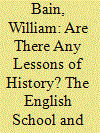

|
|
|
|
|
| Publication |
2007.
|
| Summary/Abstract |
This article explores what English School theorists claim for history in the study of international relations. The writings of Hedley Bull and Herbert Butterfield are examined with a view to providing an idealized though coherent distillation of the place historical enquiry enjoys in English School theory. The limitations of their respective positions, which cannot fully sustain the English School claim that historical knowledge is important in understanding international relations, are addressed by turning to Michael Oakeshott's conception of history as fable. The article concludes by reaffirming the place English School theorists give to historically informed theory by, paradoxically, denying to history any didactic character and therefore any practical relevance. For it will become evident that a didactic history - and whatever lessons it offers - is an illusion made in the present for the present, which is neither historical nor instructive
|
|
|
|
|
|
|
|
|
|
|
|
|
|
|
|
| 5 |
ID:
086296
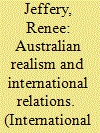

|
|
|
|
|
| Publication |
2008.
|
| Summary/Abstract |
John Anderson, Professor of Philosophy at the University of Sydney from 1927 to 1958, is not conventionally viewed as having exerted a significant influence on the development of international relations in the 20th century. Indeed, his contributions to philosophical realism and public debate in Australian society have been more readily acknowledged as his major spheres of influence. However, Anderson must also be credited with having exerted a significant influence on the intellectual development of one of the most prominent international relations theorists of the 20th century, his student Hedley Bull. With this in mind, this article assesses the impact of Anderson's teachings on Bull's thought and argues that although Bull deviated from his earliest mentor's more extreme views about ethical inquiry, his general approach to the study of international relations, understanding of international society, and sceptical attitude towards religion can, in large part, be derived from Anderson's teachings.
|
|
|
|
|
|
|
|
|
|
|
|
|
|
|
|
| 6 |
ID:
073683
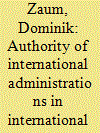

|
|
|
|
|
| Publication |
2006.
|
| Summary/Abstract |
This article analyses the way in which international administrations exercising governmental power in post-conflict territories justify their political authority in the absence of democratic legitimacy. Looking at the administrations in Bosnia, Kosovo, and East Timor, the article focuses on their establishment, their mandates, and their government practices and identifies five different sources of authority: consent, delegation, the maintenance of peace and security, the promotion of human rights and democracy, and the provision of government. However, all of these sources are contested. In particular the practices of international administrations, their lack of accountability and their limited effectiveness in providing government, undermine their authority. The article concludes by highlighting some possible avenues for enhancing the authority of international administrations.
|
|
|
|
|
|
|
|
|
|
|
|
|
|
|
|
| 7 |
ID:
145524
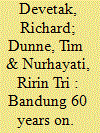

|
|
|
|
|
| Summary/Abstract |
This article examines the extent to which international society has been able to accommodate challenges such as the mid twentieth-century ‘revolt against the West’ and the twenty-first-century rise of new (especially non-Western) great powers. The Bandung conference of 1955 has commonly been seen as posing a threat to the fabric of international society by proliferating cultural and political differences. The authors show, on the contrary, that the political project of anti-colonialism and peaceful coexistence expressed at Bandung was actually consistent with a pluralist conception of international society, even if Western powers and intellectuals at the time failed to notice. The non-Western countries represented at Bandung were intent on expunging international society of the structures and practices of racism and colonialism so as to strengthen the foundations of a pluralistic international society better able to accommodate cultural and political differences.
|
|
|
|
|
|
|
|
|
|
|
|
|
|
|
|
| 8 |
ID:
148787
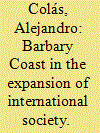

|
|
|
|
|
| Summary/Abstract |
From the ‘long’ sixteenth century the Ottoman regencies of North Africa operated as major centres of piracy and privateering across the Mediterranean Sea. Though deemed by emerging European powers to be an expression of the ‘barbarian’ status of Muslim and Ottoman rulers and peoples, piracy, and corsairing in fact played a major role in the development of the ‘primary’ or ‘master’ institutions of international society such as sovereignty, war, or international law. Far from representing a ‘barbarian’ challenge to the European ‘standard of civilization’, piracy and privateering in the modern Mediterranean acted as contradictory vehicles in the affirmation of that very standard.
|
|
|
|
|
|
|
|
|
|
|
|
|
|
|
|
| 9 |
ID:
055787
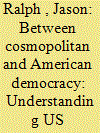

|
|
|
| 10 |
ID:
091578
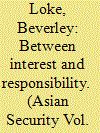

|
|
|
|
|
| Publication |
2009.
|
| Summary/Abstract |
This article is situated within the contemporary debates about the nature and purpose of China's growing power. It uses the concepts of "national interest" and "international responsibility" as a framework of analysis for Chinese foreign policy, and develops a three-dimensional typology to conceptualize their relationship (antagonistic; instrumental; mutually constitutive). This article adopts two main arguments. First, a stronger China is one gravitating toward greater notions of international responsibility, albeit instrumentally. Second, observable trends in China's evolving worldview indicate, however, that it is conceiving its national interests more broadly, embracing further socialization and greater normative commitments to international society. One may therefore view China's burgeoning global role as a great power with a degree of "cautious optimism."
|
|
|
|
|
|
|
|
|
|
|
|
|
|
|
|
| 11 |
ID:
092999
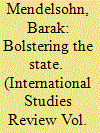

|
|
|
|
|
| Publication |
2009.
|
| Summary/Abstract |
Looking beyond the military component of the global war on terrorism this article identifies a multilateral and multidimensional effort to revamp the state-based order. This effort is guided by four principles: (i) states are the primary actors in the confrontation with the jihadi movement, and state sovereignty must be respected in the various cooperative counterterrorism efforts; (ii) as members in the international society, states hold obligations to the collective not to allow terrorists to use their territories to harm other states; (iii) because numerous states are weak, a special effort must be made to bolster states' capacities so that they will be able to realize their obligations to the society of states; and (iv) the enormous demands of capacity building necessitate particular emphasis on interstate cooperation, including the provision of assistance for weak states and sharing of best practices. The article then presents two spheres of action in the war on terrorism, indicative of this general design: the regime to suppress the financing of terrorism and states' efforts to reinforce control over their borders. It concludes by arguing that the implications of the efforts to reinforce the state-based order require that we pay it much closer attention.
|
|
|
|
|
|
|
|
|
|
|
|
|
|
|
|
| 12 |
ID:
123145
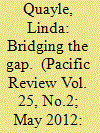

|
|
|
|
|
| Publication |
2012.
|
| Summary/Abstract |
The objective of a 'people-oriented' Association of Southeast Asian Nations (ASEAN) has not readily translated into easy relations between the Association and regional civil society. Discourse inspired by global civil society has found plenty to focus on in the gap between aspiration and practice. This article argues, however, that not enough attention has been directed to the bridges that are gradually forming across that gap, and suggests that an 'English School'-derived account can give a fuller picture of what is under way in this area. From this perspective, a process of institutionalization is observable among the different actors. By tackling - consciously or unconsciously - core problems such as recognition, location of common ground, confidence-building, and burden-sharing, this process is potentially transforming the relations of a state-imposed hierarchy into something more societal. The usefulness of such an approach lies in its ability to describe a process of slow change on its own terms, to normatively validate the fragile bridges under construction, and to stake out possibilities for progress on the basis of negotiation and accommodation.
|
|
|
|
|
|
|
|
|
|
|
|
|
|
|
|
| 13 |
ID:
086938
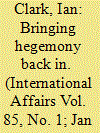

|
|
|
|
|
| Publication |
2009.
|
| Summary/Abstract |
Hegemony suffers from a bad press. It is currently used to refer simply to United States primacy. Thus presented, the US is considered to have been hegemonic since 1945, or at least since 1990. Instead, hegemony is presented here as a legitimate institution of international society in which special rights and responsibilities are conferred on the hegemon. No such hegemony exists at present. However, given today's constellation of power, a circumscribed US hegemony potentially has a distinctive contribution to make to contemporary international order. To map out such a hegemonic institution, this article reviews some historical precedents. It finds that, rather than uniform, these have taken a variety of forms, especially with respect to the scope of the legitimacy and constituency within which they have operated. A scheme of hegemonies-singular, collective and coalitional-is set out as a more realistic way of thinking about hegemony's present potential.
|
|
|
|
|
|
|
|
|
|
|
|
|
|
|
|
| 14 |
ID:
082569
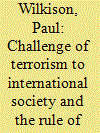

|
|
|
| 15 |
ID:
087583
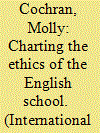

|
|
|
|
|
| Publication |
2009.
|
| Summary/Abstract |
This article aims to advance our understanding of the development of English School thinking on international ethics by outlining three phases of ethical inquiry within the British Committee. The article argues that, throughout the life of the Committee, its outlook was conditioned by a pervading moral skepticism, which was reflected in the School's commitment to a "middle-ground ethics"; however, at various times the Committee members' views changed about how maximalist the "good" could be that oriented this ethical position. Awareness of this ebb and flow helps us better understand Hedley Bull's characterization of the ethics of pluralism and solidarism within the School as well as the precise challenge contemporary English School theorists face if they are to move beyond the normative cul-de-sac that British Committee members encountered in each phase of their ethical discussions.
|
|
|
|
|
|
|
|
|
|
|
|
|
|
|
|
| 16 |
ID:
119271
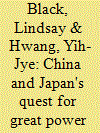

|
|
|
|
|
| Publication |
2012.
|
| Summary/Abstract |
In responding to piracy in the Gulf of Aden, both Chinese and Japanese policymakers have acted as norm entrepreneurs who intend to transform the dominant norms of international society. Chinese and Japanese norm entrepreneurship is grounded in the ways in which foreign policy actors construct and reconstruct their state identity. In China's case, policymakers have projected China's self-image as a responsible and benevolent Great Power that derives from the Chinese conception of Tianxia. Japanese foreign policy actors, on the other hand, have advanced the notion of Japan as a bridge that mediates between East and West, developing and developed states, members and non-members of international society. Although we do not advocate that Chinese or Japanese norm entrepreneurship should be accepted uncritically, we do maintain that there exist opportunities to combine and develop the multiple approaches that different states promote to problems. This article has shown that dealing with Somali piracy is one such case.
|
|
|
|
|
|
|
|
|
|
|
|
|
|
|
|
| 17 |
ID:
122949
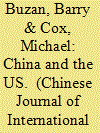

|
|
|
|
|
| Publication |
2013.
|
| Summary/Abstract |
Competing great powers, and the potential for clashes among them when there are changes of place at the top of the hierarchy, are an old story in international relations. Against this realist model of inevitably warlike power struggles stands another idea: 'peaceful rise'. China committed itself to this policy a decade ago, and arguably adopted it as far back as the shift to reform and opening up in the late 1970s. The only other modern great power than can possibly claim to have risen peacefully is the United States. Since there are only two cases of attempted peaceful rise, it is worth asking what parallels can be drawn between the United States and Chinese experiences. Given their different placements in history, with the rise of the United States having taken place between 1865 and 1945, a century earlier than China's current rise, what lessons, if any, can be learned for China from the United States experience? This article looks closely at both the meaning of 'peaceful rise' and the credibility of the United States and Chinese claims to it. It surveys the key points of similarity and difference between the United States and China during their process of rise, comparing contemporary China with the United States of the late 19th and early 20th centuries, not with today's United States. The conclusion sets out six lessons for China and for international society that can be drawn from comparing the two cases.
|
|
|
|
|
|
|
|
|
|
|
|
|
|
|
|
| 18 |
ID:
094970
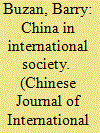

|
|
|
|
|
| Publication |
2010.
|
| Summary/Abstract |
This article reviews China's position in international society over the past couple of centuries, and against that background assesses the prospects for China's strategy of 'peaceful rise'. I stick to the label 'peaceful rise' because it is a more accurate statement of the issues than the more anodyne and diplomatic 'peaceful development' which has recently replaced it in official Chinese discourse.1 I understand 'peaceful rise' to mean that a growing power is able to make both absolute and relative gains in both its material and its status positions, in relation to the other powers in the international system, and to do so without precipitating major hostilities between itself and either its neighbours or other major powers. Peaceful rise involves a two-way process in which the rising power accommodates itself to rules and structures of international society, while at the same time other powers accommodate some changes in those rules and structures by way of adjusting to the new disposition of power and status. I am not going to question whether China will rise or not, though this is done by some.2 Instead, I take China's continued rise as given, and explore whether its peaceful rise is possible within contemporary international society.
|
|
|
|
|
|
|
|
|
|
|
|
|
|
|
|
| 19 |
ID:
102438
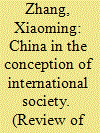

|
|
|
|
|
| Publication |
2011.
|
| Summary/Abstract |
Since Martin Wight's famous LSE lectures in the late 1950s, the English School scholars have brought China into the conception of international society. As the English School scholars have been 'inventing' an international society, China's status in the conception, or conceptions of international society has also been invented and reinvented. The Chinese case vividly demonstrates how a non-European (or non-Western) country, as one of 'the others', has been dealt with and brought into the conceptualisation of international society by the English School. China's status in the conception of international society, to a great extent, has been invented by some of the English School scholars with Eurocentric bias.
|
|
|
|
|
|
|
|
|
|
|
|
|
|
|
|
| 20 |
ID:
117784
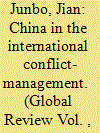

|
|
|
|
|
|
|
|